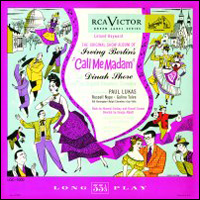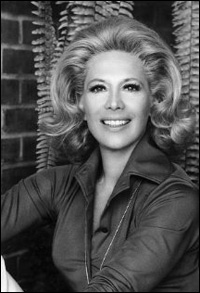
Betty Buckley: Ah, Men! [Palmetto PM 2158]
Sitting backstage during her two years as a replacement Catherine — the romantic lead of Stephen Schwartz's Pippin — Betty Buckley listened to John Rubinstein (and later Michael Rupert) do "Corner of the Sky," nightly, over the dressing room intercom. "Rivers belong where they can ramble," they sang; and Buckley occasionally wondered, why can't I have a song like that? Or like "I Can See It," the shiningly despairing male duet from Tom Jones and Harvey Schmidt's The Fantasticks.
Songwriters wrote songs like "Come Back to Me," "Luck Be a Lady" and "Hey There" for their male stars, while the leading ladies got "I Feel Pretty." Buckley never wanted to play Maria in West Side Story. She is, she tells us, Riff, and sings "The Jet Song" as evidence. Why can't Betty sing the men's songs? Why, in musical comedy terms, can't a woman be more like a man?
That is the hook for Buckley's new CD, "Ah, Men!" This originated at Feinstein's in October 2011, one of Buckley's most enjoyable turns in years — because, in part, she was decidedly not singing the same old songs. The CD captures the very special club act, including a piece of special material originating with "Why Can't a Woman?" (AKA My Fair Lady's "A Hymn to Him"). This deft parody was arranged by Eric Stern — drawing on show tunes by everyone — with new lyrics by Eric Kornfeld, and it turns out to be as good as you hope it will be. (She tells us all about that trouble in River City, and notes that it would be nice to have "a King Arthur who can actually sing.")
But that's the gimmicky part of the program. The strength is when Buckley sings for real. William Finn's "Venice," for example. Buckley gave some terrific performances of some terrific songs in Elegies over at Lincoln Center in 2003, but this is the one that gripped her as Rupert sang it night after night. ("Venice" — at Feinstein's — had the audience so shatteringly still that the ice cubes in the glasses stopped clinking.) Or listen to her Sweeney Todd Suite. "Not While I'm Around" for the ragamuffin Tobias, "Johanna" for the noble sailor Antony, and Sweeney's own love song to his razors, "My Friend." Three distinct characters, three distinct impersonations, and let me say that Buckley's brief take on Mr. Todd was chilling. Why can't a woman...?
Visit PlaybillStore.com to view theatre-related recordings for sale.
| |
 |
|
| Cover art for Call Me Madam |
There is something to be said for the sound of the original Broadway cast album, circa 1950. Fidelity was on the low side, decidedly; the musical numbers were often truncated, the better to fit on a single side of a 78. (Long playing records had been introduced in 1948 by Columbia Records, but cast albums were still being released as sets of five or six, two-sided, 78 RPM platters.)
But these now-ancient recordings almost scream the word Broadway in a manner that 21st-century OBCs rarely do. And given the remastering and remixing capabilities of current-day recording engineers, the old platters can be cleaned up and aurally overhauled.
One of the oddest cast albums of that olden day — and one which, due to said oddity, was for many years difficult to come across — is Irving Berlin's 1950 musical, Call Me Madam. This was a major hit for as long as Ethel Merman remained willing, though without the legs of the prior Berlin-Merman smash, Annie Get Your Gun. When Ethel stood on the stage of the Imperial and let loose, everybody was exceedingly happy.
Everyone was happy, that is, except RCA, which controlled the recording rights. Merman was under exclusive contract to Decca Records, the trailblazer in the Broadway cast album field which was just then beginning to suffer from the competition offered by Columbia and RCA. (Decca — label of Oklahoma! and Carousel — never quite rebounded from the loss of hits like Kiss Me, Kate, South Pacific and Gentlemen Prefer Blondes to Goddard Lieberson at Columbia. They did well with Guys and Dolls in 1950 and The King and I in 1951, but by then Columbia was clearly the label of choice.)
It was a common occurrence for labels to release their performers in cases like this; surely Leland Heyward, producer of Call Me Madam, anticipated that Merman would be lent by Decca. (Heyward was first and foremost a high-powered agent, with his big name list of clients including Merman.) Heyward arranged for NBC — RCA's parent company — to finance the show, in exchange for the investor's share of the profits plus the cast album rights. Which presumably left him embarrassed when he couldn't deliver Ethel.
| |
 |
|
| Dinah Shore |
So what of the Merman-less original cast recording of Call Me Madam? The discussion begins with Dinah Shore, who had just signed an expensive deal with RCA. Shore had been a top recording star for almost a decade. It turns out that she is pretty good as Mrs. Sally Adams, the self-described "hostess with the mostes' on the ball." Shore's Southern lilt does well enough with the numbers, and I suppose that she'd be fine if we'd never heard of Merman.
What makes this album — which has in the past appeared on non-authorized CDs, but is now brought to us in fine condition by Masterworks Broadway — so listenable takes us back to the beginning of this discussion. This is a 1950 original Broadway cast album in all its glory. What did a Broadway musical comedy sound like back then? Abbott musicals of the era — for this was a George Abbott musical — typically featured a bright, brash orchestration from orchestrator Don Walker. (Joe Glover did four numbers, including the song hit "You're Just in Love." There were also the usual ghosts, with "Hostess with the Mostes'" bearing Red Ginzler's stylistic fingerprints. For the recording, RCA added studio orchestrator Hugo Winterhalter to do some minor augmentation for Shore.)
You have a big chorus, with strong-voiced singers. Madam was conducted by Jay Blackton, of Oklahoma!, Annie Get Your Gun and more. While the vocal arrangements aren't credited, I suspect that they are his. The score itself, from Mr. Berlin, is — for me — only a B+ effort; "Hostess," "It's a Lovely Day Today" and "You're Just in Love" are dandy, but the big booming ballads don't quite get to me and the rest is in the average range. With Merman singing the songs, though, I'm sure the show provided rollicking entertainment.
The other feature of this original Broadway cast album is — well, the original Broadway cast. The standout is Russell Nype, who took his first of two 1950s Tonys playing the juvenile lead and singing that big, show-stopping duet with Merman. ("Put your head on my shoulder, you need someone who's older," she sings.) Nype, by the way, had made his Broadway debut a year earlier as Leo, the ne'er-do-well youngest of the little foxes in Marc Blitzstein's Regina; that's a performance we'd like to have heard.
Leading man to Merman was Paul Lukas, who won the 1943 Oscar for recreating his Broadway role in Lillian Hellman's 1941 drama Watch on the Rhine. (So strong was Lukas as a noble, German refugee that he beat out both Humphrey Bogart in "Casablanca" and Gary Cooper in "For Whom the Bell Tolls.") Lukas sings his songs like — well, like a refugee dramatic actor. Also featured in the show as a mittel-European princess was Galina Talva, who has quite an accent as she sings an ode to an ocarina and who never seems to have resurfaced since.
As for Merman's Decca album — with a studio orchestra, unengaging orchestrations, and a small supporting cast (including pop singer Dick Haymes singing Nype's role) — it did extremely well. But I haven't cared to listen to it since I first discovered RCA's Merman-less Madam.
Visit PlaybillStore.com to view theatre-related recordings for sale.
| |
 |
|
| Scott Alan |
Songwriter Scott Alan returns with his fourth album, in a string which started with "Dreaming Wide Awake" back in 2007. This time out we have "Scott Alan Live," a cram-packed-with-talent concert recorded on April 30 at Birdland. Alan writes distinctive, highly emotional songs which stand on their own as performance pieces; that performers are attracted to work of this sort is apparent from the lineup of theatre names who stepped in to sing a solo each. This two-disc set has 25 songs, all but two recorded live at Birdland; how they had time to cram it into one set, and how they had space to fit 30-or-so singers plus a 12-piece band into the club on the far side of West 44th, I can't imagine.
Yet here they are, a lineup showcasing stars and newcomers, including a fair assortment of leading players from last season’s crop of new musicals. Which is to say Laura Osnes, Jeremy Jordan and Melissa van der Schyff from Bonnie & Clyde; Mr. Jordan and Ben Fankhauser, from Newsies; and Richard Fleeshman and Caissie Levy from the now departed Ghost. Plus a host of favorites including the Callaway sisters, Stephanie J. Block, Sierra Boggess, Ramin Karimloo, Christiane Noll, Julia Murney, Lea Salonga.
All of them and more came together to sing Mr. Alan's typically soaring solos. It must have been some wild night; there are crowd ovations after each and every number, so loud and vociferous that you kind of wish they were engineered down on the CD. Alan, meanwhile, remains one of those up-and-coming songwriters whose work continues to intrigue us.
Visit PlaybillStore.com to view theatre-related recordings for sale.
(Steven Suskin is author of "Show Tunes" as well as "The Sound of Broadway Music: A Book of Orchestrators and Orchestrations," "Second Act Trouble," the "Broadway Yearbook" series and the "Opening Night on Broadway" books. He also pens Playbill.com's Book Shelf and DVD Shelf columns. He can be reached at [email protected].)










